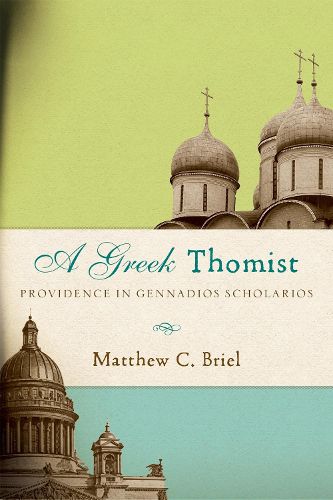Readings Newsletter
Become a Readings Member to make your shopping experience even easier.
Sign in or sign up for free!
You’re not far away from qualifying for FREE standard shipping within Australia
You’ve qualified for FREE standard shipping within Australia
The cart is loading…






Matthew Briel examines, for the first time, the appropriation and modification of Thomas Aquinas’s understanding of providence by fifteenth-century Greek Orthodox theologian Gennadios Scholarios. Briel investigates the intersection of Aquinas’s theology, the legacy of Greek patristic and later theological traditions, and the use of Aristotle’s philosophy by Latin and Greek Christian thinkers in the thirteenth to fifteenth centuries. A Greek Thomist reconsiders our current understanding of later Byzantine theology by reconfiguring the construction of what constitutes orthodoxy within a pro- or anti-Western paradigm. The fruit of this appropriation of Aquinas enriches extant sources for historical and contemporary assessments of Orthodox theology. Moreover, Scholarios’s grafting of Thomas onto the later Greek theological tradition changes the account of grace and freedom in Thomistic moral theology. The particular kind of Thomism that Scholarios develops avoids the later vexing issues in the West of the de auxiliis controversy by replacing the Augustinian theology of grace with the highly developed Greek theological concept of synergy. A Greek Thomist is perfect for students and scholars of Greek Orthodoxy, Greek theological traditions, and the continued influence of Thomas Aquinas.
$9.00 standard shipping within Australia
FREE standard shipping within Australia for orders over $100.00
Express & International shipping calculated at checkout
Matthew Briel examines, for the first time, the appropriation and modification of Thomas Aquinas’s understanding of providence by fifteenth-century Greek Orthodox theologian Gennadios Scholarios. Briel investigates the intersection of Aquinas’s theology, the legacy of Greek patristic and later theological traditions, and the use of Aristotle’s philosophy by Latin and Greek Christian thinkers in the thirteenth to fifteenth centuries. A Greek Thomist reconsiders our current understanding of later Byzantine theology by reconfiguring the construction of what constitutes orthodoxy within a pro- or anti-Western paradigm. The fruit of this appropriation of Aquinas enriches extant sources for historical and contemporary assessments of Orthodox theology. Moreover, Scholarios’s grafting of Thomas onto the later Greek theological tradition changes the account of grace and freedom in Thomistic moral theology. The particular kind of Thomism that Scholarios develops avoids the later vexing issues in the West of the de auxiliis controversy by replacing the Augustinian theology of grace with the highly developed Greek theological concept of synergy. A Greek Thomist is perfect for students and scholars of Greek Orthodoxy, Greek theological traditions, and the continued influence of Thomas Aquinas.